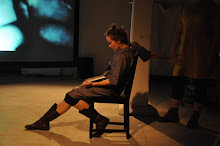What makes the book wonderful is that while, after 700 pages, you trust the narrator so much that you would follow him to Hell on your knees, he's so good at playing Devil's Advocate with his many, mostly depraved characters that you're never sure whose side he's on. A new one comes along and you think, "here's a good guy" only you're not really sure what Mann's game is. Is he setting you up to like a particular character, only to make you feel terrible later on when the guy pulls some unthinkable, heartless stunt? (But he seemed so nice!) The point, I think, given that the book is about the state of mind and politics that led somehow, painfully, unbelievably to the Great War, is if that the character and opinions and lusts of any man -- whether he's an intellectual or an ignoramus -- lead to violent measures, they ought to be cross-examined. But then, given history, or given this particular novel, how do you know a good guy when you've got one, seeing how good ideas can lead to hideous conclusions? You can't.
At the end of the book, there's a moment when two characters whose debates account for about one third of the book's length decide that their political-theoretical differences are so insoluble they have to have a duel. One of these two characters is the one I most wanted to trust in the book. In the end, he's willing, literally, to die for his ideas. But then, this seems both heroic and at the same time stupidly suicidal.
What do YOU think, Thomas?
If I didn't think it was wonderful, Majel, if I didn't think ideas can and do have real and practical weight, I'd be a sham philosopher.
But, Thomas, the question I'm asking is, if your ideas lead to combat, what then? Forge on?
That is the question, Majel.
Here's the passage that made my bones shiver.
"...You are mistaken first in the assumption that intellectual matters cannot be personal. You should not suppose that. You are, however, above all mistaken in your assessment of the intellect, which you apparently consider too weak to produce conflicts and passions as harsh as those that real life brings with it ... The purified abstraction, the idea, is at the same time also the absolute, is thus rigor itself, and contains far more profound and radical possibilities for hatred, for categorical and irreconcilable hostility than are found in social life..."
Is Mann messing with my head? Does he believe ideas are worth going to war for, or doesn't he? I am in a troubled state. A state of reckoning; I want to get my priorities straight. What will I go to war for?
...
I went to a collosal party last night (see below) where Konrad, my dear friend Konrad, told me it would be better for everyone if I were happily intoxicated in a heap in the corner. I can't possibly expect to be able to enjoy Berlin if I'm not willing to do that, he said.
How do you know when you're old? Because I feel old.

This was some kind of giant competition between bands from all over Germany and here was one of the last three. They were all pretty bad. And I lost my priceless, darling, yellow antique gloves that I bought at a Flohmarkt on the U2 line. Actually, I only lost one, which is worse. And I blew off the Aida dress rehearsal. Both of these experiences (the latter is more like just massively poor judgement) happened after I ate a mount (mount, not mound) of chocolate cake. I think I see a pattern.
*Matt, I can't thank you enough for recommending this book.





